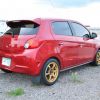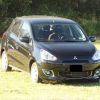Sure it could: the $4000 is fully accountable. (Assuming you are comparing the Base Fit to a Fit optioned out to +$4000).
Whereas if you are comparing a Fit to being $4000 more than a Mirage (for example), again it could readily be accounted for. Factory capital costs, labor, materials, design, development, etc. all the factors are there.
Ceteris paribis - they're both cars but it's a bit apples to oranges, IMO.
Because of a deserved reputation the Honda can add a 'premium' price: because it has built its reputation for quality, just as the obverse is applicable too, take a Yugo for example, total POS and its reputation as such was deserved. So, if/when the quality of a product is controlled in production the final sold product is realized as being "good quality," and the product sustains the investment into quality by being bought.
As for measuring quality - without question it's measurable, it's a whole job field: QC and QA, quality control and quality assurance. Given a specification one measures how a product adheres to that spec. From the little individual pieces to the product as a whole, the quality can be measured and controlled. In many instances it's the quality you pay for.
The build quality for a Lexus, to a Toyota, to a Scion is a good spectrum example, as they are all from the same company. The Lexus would have the tightest tolerances (if your old enough you may remember their ads rolling a ball-bearing along the body gaps to demonstrate the uniformity/tolerances). A Toyota on the other hand might have looser tolerances for the same items and the Scion even looser. However the Scion would still have the foundation of being a "Toyota" behind it, and it's a quality product - but its level of quality (the attention to detail) is several degrees removed from the Lexus in all aspects, and hence the considerable price differential.
Last edited by Minihaha; 07-24-2014 at 09:37 PM.
Reason: sore eyes, lol... (and added a lil' text here & there)
ゼロ

__________________________________________
 View my fuel log 2014 Mirage DE 1.2 manual: 33.4 mpg (US) ... 14.2 km/L ... 7.0 L/100 km ... 40.1 mpg (Imp)
View my fuel log 2014 Mirage DE 1.2 manual: 33.4 mpg (US) ... 14.2 km/L ... 7.0 L/100 km ... 40.1 mpg (Imp)


 Focus
Focus
 Reply With Quote
Reply With Quote
 ゼロ
ゼロ

 2014 Mitsubishi Mirage / ES
2014 Mitsubishi Mirage / ES

 Bae
Bae
 Eleanor
Eleanor Snowy
Snowy